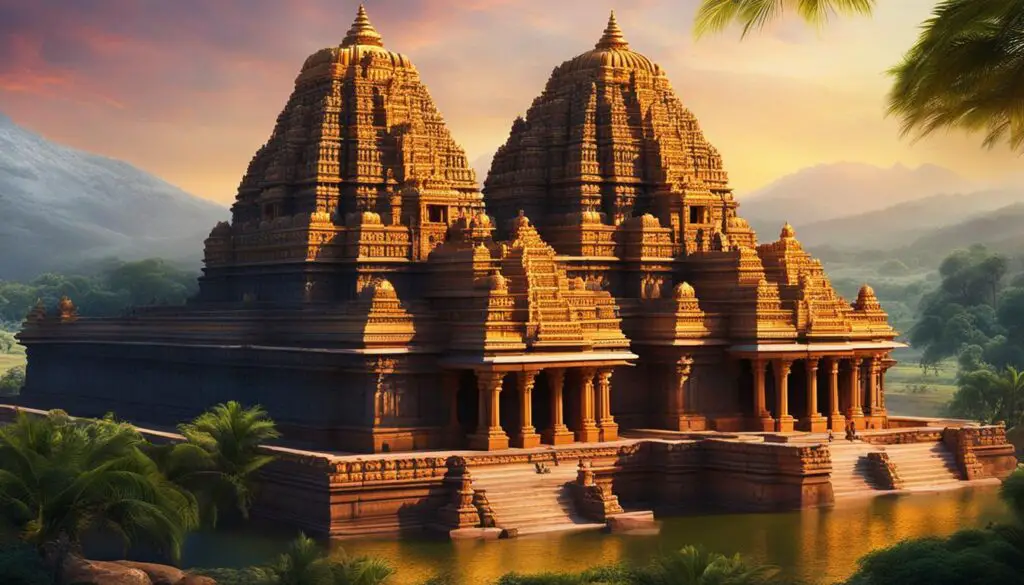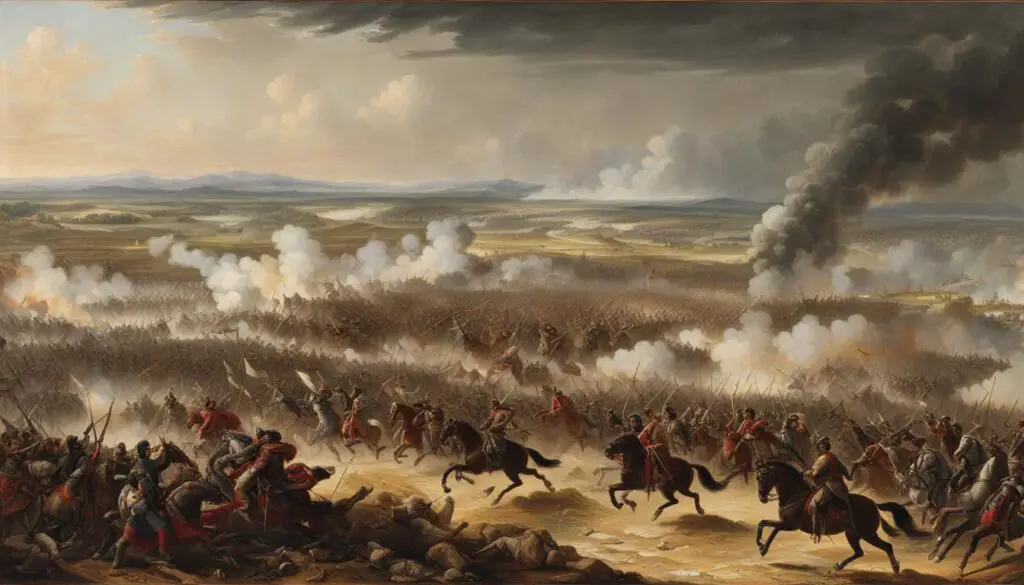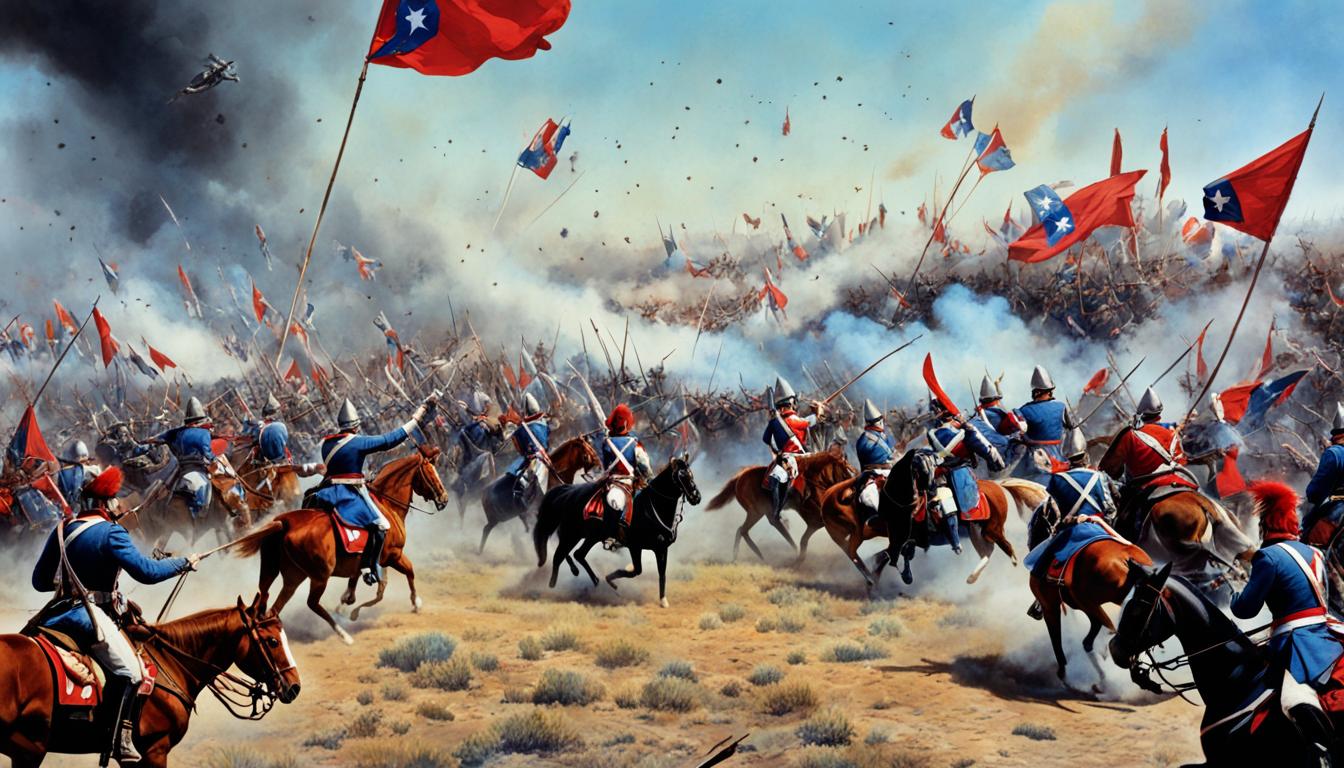Have you ever wondered what event reshaped the dynastic landscapes of India? What pivotal moment marked the downfall of a once powerful empire and led to the emergence of new political powers? Join us as we delve into the Battle of Talikota, a defining moment in Indian history that challenged the established order and shaped the course of South Indian and Deccan politics.
Key Takeaways:
- The Battle of Talikota, fought in 1565, was a crucial event in Indian history.
- The Vijayanagara Empire faced an alliance of the Deccan sultanates, resulting in its defeat and collapse.
- The battle reconfigured South Indian and Deccan politics, establishing the sultanates as the dominant power.
- The legacy of the Battle of Talikota led to the decline of the Vijayanagara Empire’s cultural and architectural heritage.
- This battle is remembered as a significant turning point that altered the course of Indian history.
Background of the Battle
The Vijayanagara Empire, a powerful Hindu empire that dominated South India, faced significant threats from the Deccan sultanates of Ahmadnagar, Bijapur, Bidar, and Golconda. These sultanates joined forces against the Vijayanagara Empire due to its expansionist policies and the empire’s attempts to control the lucrative spice trade routes.
Rama Raya, the ruler of Vijayanagara, had effectively maintained his power through astute political strategies. However, his aggressive efforts to maintain control over Kalyan and tensions with the allied sultanates ignited hostilities. These mounting tensions ultimately culminated in the Battle of Talikota in late January 1565.
The battle between the Vijayanagara Empire and the Deccan sultanates became a significant turning point in South Indian and Deccan politics, reshaping the dynamics of power in the region.

“The Battle of Talikota was a defining moment in the history of South India. It marked a monumental shift in power and set the stage for significant changes in the socio-political landscape of the region.” – Historian, Dr. Arun Kumar
The Battle and its Aftermath
The Battle of Talikota was a significant turning point in Indian history, resulting in the defeat and collapse of the Vijayanagara Empire. Despite its larger size, the Vijayanagara Empire suffered a comprehensive defeat against the united Deccan sultanates.
The battle led to the capture and beheading of Rama Raya, the ruler of Vijayanagara, which ultimately led to the collapse of the empire. The Deccan sultanates took advantage of their victory and proceeded to plunder Vijayanagara, causing immense damage to the once-great city. This defeat had far-reaching consequences, reshaping the political landscape of the Deccan region.
The Battle of Talikota marked the beginning of the end for the Vijayanagara Empire, as it disintegrated following the defeat. The emerging power of the Deccan sultanates permanently reconfigured the politics of South India and the Deccan region.

| Impact of the Battle of Talikota | Description |
|---|---|
| Defeat of Vijayanagara Empire | The battle marked the decisive defeat of the Vijayanagara Empire, leading to its collapse and disintegration. |
| Rise of Deccan Sultanates | The victory of the Deccan sultanates established them as the dominant power in the region, reshaping the political dynamics. |
| Plunder and Destruction | Vijayanagara was looted and extensively damaged by the victorious sultanates, resulting in the decline of the empire’s cultural and architectural heritage. |
| Reconfiguration of Deccan Politics | The battle permanently reshaped the political landscape of the Deccan region, with the emergence of the Deccan sultanates as the new power players. |
Legacy of the Battle
The Battle of Talikota had a profound and long-lasting impact on the Vijayanagara Empire. Following the destruction of Vijayanagara, the empire experienced a significant decline in its cultural and architectural heritage. The once vibrant arts and literature scene, which the empire had been known for, came to a halt. The Vaishnava cult, which thrived in the city, perished.
The Bijapur Sultanate emerged as the greatest beneficiary of the battle, while their alliance with the other Deccan sultanates was short-lived. The defeat at Talikota led to a political rupture and allowed for the rise of local chieftains, triggering continuous conflicts that ultimately led to the disintegration of the Vijayanagara Empire.
The Battle of Talikota remains a significant and memorable event in Indian history. It serves as a reminder of the impact of conflicts on civilizations, as well as the enduring consequences they can have on political powers, artistic expression, and cultural legacies.
FAQ
What is the Battle of Talikota?
The Battle of Talikota, fought on January 23, 1565, near the village of Talikota in present-day Karnataka, was a pivotal event in Indian history. It marked the overthrow of the Vijayanagara Empire and the reconfiguration of South Indian and Deccan politics.
Who were the major parties involved in the Battle of Talikota?
The Vijayanagara Empire, a powerful Hindu empire that dominated South India, faced an alliance of the Deccan sultanates including Ahmadnagar, Bijapur, Bidar, and Golconda.
How did the Battle of Talikota impact the Vijayanagara Empire?
The Battle of Talikota resulted in the comprehensive defeat of the Vijayanagara Empire. Rama Raya, the ruler of Vijayanagara, was captured and beheaded, leading to the collapse of the empire. The defeat also caused the decline of the empire’s cultural and architectural heritage, the cessation of their patronage of the arts and literature, and the perishing of the Vaishnava cult in the city.
What was the aftermath of the Battle of Talikota?
The defeat in the Battle of Talikota had a lasting impact on the Vijayanagara Empire. The sultanates went on to plunder Vijayanagara, causing significant damage. The empire disintegrated, and conflicts between local chieftains arose, ultimately leading to the empire’s disintegration.
Why is the Battle of Talikota considered a turning point in Indian history?
The Battle of Talikota reshaped the dynastic landscapes of India. It resulted in the collapse of the Vijayanagara Empire and the emergence of the Deccan sultanates as the dominant power in South Indian and Deccan politics. The battle is still remembered as a significant event in Indian history.
Source Links
- https://en.wikipedia.org/wiki/Battle_of_Talikota
- https://bharatstories.com/battle-of-talikota-a-decisive-turning-point-in-indian-history/
- https://thediplomat.com/2015/06/450-years-ago-this-battle-changed-the-course-of-indian-history/

